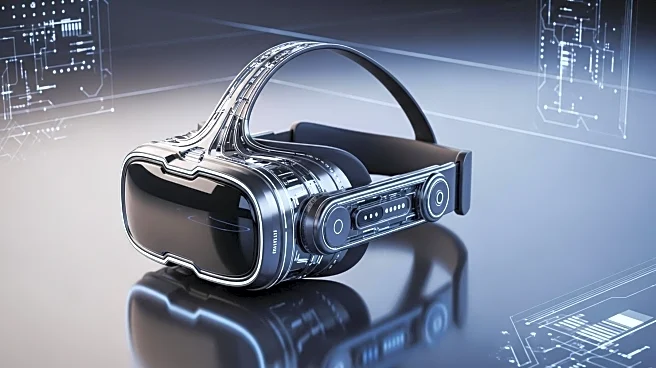What is the story about?
What's Happening?
Despite significant technological advancements in virtual reality (VR) headsets, consumer interest appears to be waning. Recent developments include Pimax's Dream Air and Dream Air SE headsets, which boast features such as micro OLED panels and 4K resolution in each eye, along with a motorized self-tightening headstrap. Samsung is also preparing to release its Project Moohan XR headset, which aims to compete with Apple's Vision Pro. However, sales of VR headsets have declined for the third consecutive year, with Meta's Reality Labs reporting a 6% revenue drop due to decreased Quest sales. The market's reluctance to embrace these innovations may be attributed to the physical discomfort and high costs associated with VR headsets.
Why It's Important?
The decline in VR headset sales, despite technological improvements, highlights a potential shift in consumer preferences towards more lightweight and practical devices like smart glasses. This trend could impact the future of VR and XR industries, as companies may need to reconsider their strategies to align with consumer demands for more accessible and comfortable technology. The ongoing development of smart glasses, such as Meta's Ray-Ban Display, suggests a growing interest in augmented reality (AR) devices that offer practical functionalities without the bulkiness of traditional VR headsets. This shift could influence investment and innovation priorities within the tech industry.
What's Next?
As VR headsets continue to evolve, manufacturers may focus on addressing consumer concerns regarding comfort and usability. Companies like Meta and Samsung might explore ways to reduce the weight and improve the user experience of their devices. Additionally, the development of more affordable and practical AR devices could further challenge the VR market, prompting manufacturers to innovate and adapt. The industry may also see increased competition as new players enter the market with alternative solutions that cater to consumer preferences for lighter and more versatile technology.
Beyond the Headlines
The current state of the VR market raises questions about the long-term viability of headsets as mainstream consumer products. Ethical considerations regarding user privacy and data security in VR environments may become more prominent as the technology advances. Furthermore, cultural shifts towards more integrated and less intrusive technology could drive the demand for AR devices that seamlessly blend into everyday life. These factors may influence the direction of future technological developments and consumer adoption patterns.

















